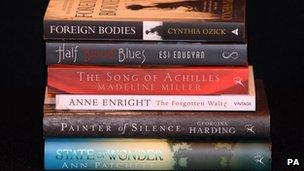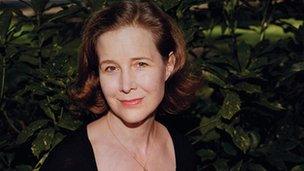Orange ends sponsorship of women's fiction prize
- Published

Orange's sponsorship ends after this year's awards
Orange has announced that it is to end its sponsorship of The Women's Prize for fiction.
The mobile services company, which has sponsored the prize since it was established 17 years ago, is to focus its brand on the film industry.
Novelist Kate Mosse, the prize's honorary director, said she was in "active discussions with a number of potential new sponsors".
The £30,000 prize recognises English language fiction written by women.
The announcement comes a week before the winner of this year's Orange Prize is to be announced in London.
Mosse, who co-founded the prize in 1996, said: "Our partnership has delivered everything - and more - than we hoped for. A celebration of international writing by women, one of the most significant arts awards in the UK and also a major force in education, literacy and research.
"This is the end of an era but no arts project should stand still and we are now looking forward to developing the prize with a new partner."
She added: "These are very challenging but also exciting times in publishing and we hope that the Prize for Fiction will continue to make as significant a contribution going forward as it has over the last 17 years. To that end, we are in active discussions with a number of potential new sponsors and look forward to the start of another exciting chapter for the prize."
In an open letter on the Orange Prize website, Mosse invites potential sponsors to get in contact.
Steven Day, brand chief for Everything Everywhere, the name of the company formed when Orange joined forces with T-mobile, said: "While relinquishing sponsorship of the Prize is tinged with sadness, we're hugely proud of what Orange and the Women's Prize for Fiction have achieved over the past 17 years."
He said the partnership had raised the profile of international literature written by women and taken the Orange brand "into areas that were traditionally harder to reach".
He added: "It is now time for us to celebrate our 17 wonderful years - concluding with the wonderful programme for 2012 - and then hand over to a new sponsor to take the Prize forward as the Orange brand looks to build on its established association with film in the UK."
In a separate statement, Orange said agreements had been signed to continue its headline sponsorship of the Bafta film awards, Orange Wednesdays tickets initiative and its pre-film advertising slot in cinemas throughout 2013.
'Successfully branded'
As well as the women's fiction prize, Orange is ending its five-year partnership with RockCorps - a community programme that rewards volunteers with gig tickets - and its 11-year sponsorship of the National Business Awards.
"I'm disappointed that Orange won't be sponsoring the award in future, if only because the name has been so successfully branded," said Lionel Shriver, who won the Orange Prize in 2005 for We Need To Talk About Kevin.
"It was frustrating that the Whitbread [Book Awards] had to transform into the Costa, for example, because these new designations always involve a dilution of name recognition," she told the BBC.

Ann Patchett is among this year's nominees
This year's Orange Prize winner will be presented with a cheque for £30,000 and a limited-edition bronze statue known as the Bessie at an award ceremony at London's Royal Festival Hall on 30 May.
Former Orange Prize winner Ann Patchett is among this year's six shortlisted nominees for her novel State of Wonder.
Also on the shortlist are: Esi Edugyan for Half Blood Blues, Anne Enright for The Forgotten, Georgina Harding for Painter of Silence, Madeline Miller for The Song of Achilles and Cynthia Ozick for Foreign Bodies.
This year's judging panel is chaired by novelist Joanna Trollope with writers and broadcasters Lisa Appignanesi, Victoria Derbyshire, Natalie Haynes and Natasha Kaplinsky.
Previous winners of the prize, which is backed by the UK charity Booktrust, include Zadie Smith for On Beauty (2006) and Tea Obreht for The Tiger's Wife (2011).
- Published17 April 2012
- Published2 August 2011
- Published12 October 2011
- Published8 June 2011